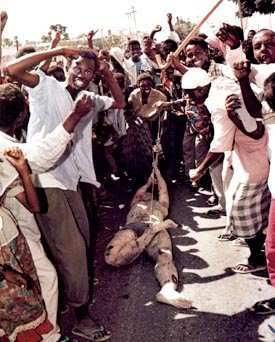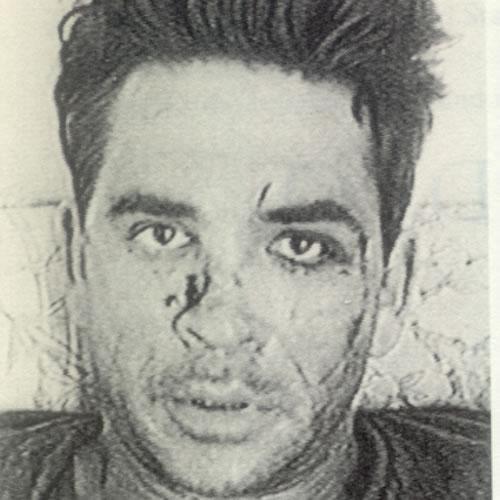“We have Animal Howe,” one of the young Somalian ringleaders said, referring to the hated American U.N. administrator, retired Adm. Jonathan Howe.
“This is an American soldier,” one of the Saudis said. “If he is dead, why are you doing this? Aren’t you a human being?”

One of the Somalis pointed his rifle at the soldier. “We will kill you, too,” he said.
Some in the crowd began shouting at the Saudis: “Leave here! Leave it alone! The people are angry. They might kill you.”
“But why do you do this?” the soldier demanded. “You can fight and the Americans can fight, but this man is dead. Why do you drag him?”
Angry men in the crowd again threatened the Saudis, who climbed back into their vehicles and left.
CHAPTER 28
On TV, Durant’s Battered Face

IN THE FIRST DAY of captivity, still flat on his aching back on a tile floor in a small octagonal room, his right leg broken, with a bullet wound now in his shoulder, Blackhawk pilot Mike Durant was asked by his captors to make a video.
“No,” Durant said.
He was surprised they’d asked. If they wanted to make a video, they were going to anyway. But, since they asked, he said no. It was safer not to be in that position, speaking to the world from captivity.
It was Oct. 4, a Monday. America had awakened to a tragedy in Mogadishu. Eighteen dead soldiers. More than 70 wounded. Hundreds of Somalis dead. On the TV screen came horrible images of a dead American soldier being dragged through the city’s dusty streets by angry crowds.
President Clinton was in a hotel room in San Francisco when he saw the pictures. He was horrified and angry, according to an account in Elizabeth Drew’s book On the Edge. He wanted to know who had made the decision to undertake this mission. Why hadn’t he been informed?
“How could this happen?” he demanded.
Stephanie Shughart, the wife of Commando soldier Randy Shughart, had received word at 10 the night before. One of the other Fort Bragg, N.C., wives had called with the first drop of bad news: “One of the guys has been killed.”
One of the guys.
She had talked on the phone with Randy on Friday night. As usual, he had said nothing about what was going on, just that it was hot, he was getting enough to eat, and he was getting a great tan. He told her he loved her. He was such a gentle, loving man. It seemed so odd how he made a living, that he was a warrior.
One of the guys.
At the hangar in Mogadishu, the men had watched the dead soldier being dragged through the streets. They crowded into the back room and watched it replay on the screen. No one said a word. Some of the men turned away. The pilots wanted to mow them down, just mow them all down, land, and recover the body. But the commanders said no. There was a big crowd around the body. It would be a massacre.
Sgt. First Class John Macejunas was getting ready to go back out. The blond Commando had gone out into the fight three or four times the day and night before. When the rescue convoy couldn’t reach Durant’s crash site, Macejunas had led a small squad to the site on foot, scouring the area for his friends. Now he was dressed as a civilian, a journalist. He was going back out into the city to look for his brothers, alive or dead. The Rangers who saw him were in awe of the man’s courage and cool.
AT VOLUNTEER HOSPITAL, surgeon Abdi Mohamed Elmi was covered with blood and exhausted. The wounded had started coming in early the evening before. It was just a trickle at first, despite the great volume of gunfire. There were burning roadblocks throughout the city, and the American helicopters were buzzing low and shooting, and most people were afraid to venture out.
Before the fight started, the Volunteer Hospital was almost empty. It was located down near the Americans’ base by the airport. After the trouble had started with the Americans, most Somalis were afraid to come there. By the end of this day, Oct. 4, all 500 beds in the hospital would be full, and at least 200 more wounded would be lined in the hallways. And Volunteer wasn’t the biggest hospital in the city. The numbers were even greater at Digfer. Most of those with gut wounds would die. The delay in getting them to the hospital—many more would come today than came yesterday—allowed infections to set in that could no longer be successfully treated with what antibiotics the hospital could spare.
The three-bed operating theater at Volunteer had been full and busy all through the night. Elmi was part of a team of seven surgeons who worked straight through without a break. He had assisted in 18 major surgeries by sunrise, and the hallways outside were rapidly filling with more, dozens, hundreds more.
It was like some tidal wave of gore.
He finally walked out of the operating room at 8 a.m., and sat down to rest. The hospital was filled with the chilling screams and moans of broken people, dismembered, bleeding, dying in horrible pain. Doctors and nurses ran in the hallways, trying to keep up. Elmi sat on a bench smoking a cigarette quietly. A French relief worker who saw him sitting down approached him angrily.
“Why don’t you help these people?” she shouted at him.
“I can’t,” he said.
She stormed away. He sat until his cigarette was finished. Then he stood and went back to work. He would not sleep for another 24 hours.
DURANT’S CAPTORS showed up with a camera crew that evening, Oct. 4. It had been a full day since he crashed and was carried off in an angry swarm of Somalis. He was hungry, thirsty and still terrified. His face was bloody and swollen from where a militiaman had smacked him in the face with the butt of a rifle.
There were about 10 young men in the crew. They set up lights, a lot of lights. Only one of the crew spoke to him. The man spoke fairly good English.
Durant had been trained to undergo trials such as this. The key was to offer as little information as possible, to be cagey, not confrontational. His interrogators were not very skillful. There was a code of conduct spelling out what he could say and what he couldn’t say, and Durant was determined to abide by it.
Men had been questioning him on and off all day, trying to get him to tell them more about who he was and what his unit was trying to do in Somalia. When the camera was turned on, the interviewer began pressing him on the same points. The Somalis considered all the Americans with the task force to be Rangers. “No. I’m not a Ranger,” Durant told him. He was a pilot.
“You kill people innocent,” the interviewer insisted.
“Innocent people being killed is not good,” Durant said.
That was the best they got out of him. Those were the words people all over the world would be seeing on their TVs the next day. Durant’s swollen, bloody face, with his dark hair sticking straight up, and a wild, frightened look in his eye, lifted off the videotape, would soon be in newspapers and on the covers of newsmagazines worldwide.
After the camera crew left, a doctor showed up. He was kind, and he spoke English well. He told Durant he had been trained at the University of Southern California. He apologized for the limited supplies he had with him, just some aspirin, some antiseptic solution and some gauze. He used forceps and gauze and the solution to gently probe Durant’s leg wound, where the broken femur poked through the skin, and he cleaned off the end of the bone and the tissue around it.
It was sharply painful, but the pilot was grateful. He knew enough about wounds to know that a femur infection was relatively common, even with simple fractures. His was compound, and he had been lying on a dirty

